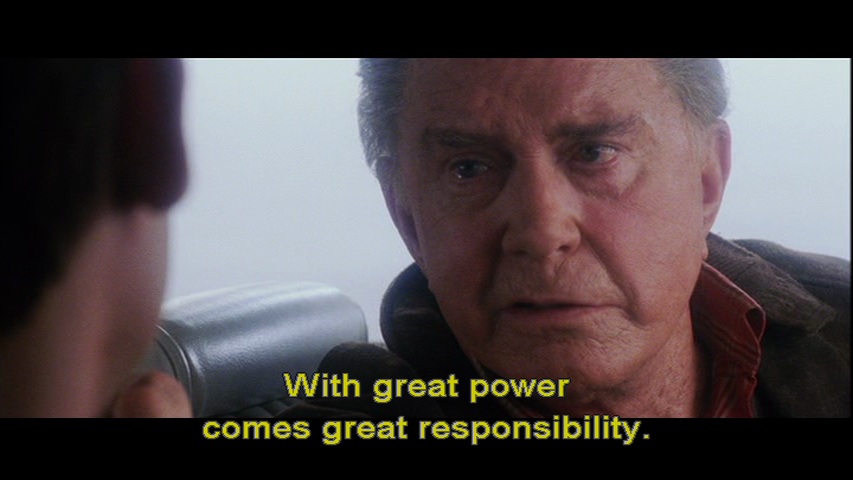Spider-Man: With Great Power Comes Great Responsibility
Psalm 38:4 My guilt has overwhelmed me
like a burden too heavy to bear.
Psalm 32:5 Then I acknowledged my sin to
you and did not cover up my iniquity. I said, "I will confess my transgressions
to the LORD"-- and you forgave the guilt of my sin.
Our theme for Training Camp
this year was “Training Camp Assemble.” With the explosion of superhero movies
in the last few years, we took the opportunity during Bible study to examine
some of the superpowers of these heroes and see what the Bible has to say about
them. With Captain America Iron Man.
We also studied one of my
favorite superheroes – Spider-Man. Growing up, I read the comic books and
especially enjoyed the 1960s campy cartoon. But perhaps the real draw is that Stan
Lee, the creator of Spider-Man, conceived of a super-hero who had real-life
personal problems and insecurities from being a teenager.
After Peter Parker is bitten
by a radioactive spider, he receives the proportional speed, strength, and
agility of a spider. At first, Peter wanted to use these amazing powers in
selfish ways. He wanted to get some money to buy a car and impress a girl. His
selfishness led him to avoid stopping a robbery. That robber then went out and
killed Peter’s Uncle Ben. When Peter realized what had happened, he was
devastated by the fact that he could have saved his Uncle Ben if he had acted.
He remembered what his Uncle Ben had said to him a few hours earlier, “With
great power comes great responsibility.”
At least at first, guilt is
the driving motivation for Peter to become Spider-Man and use his great powers
responsibly as a superhero. Peter felt tremendous guilt that he didn’t do the
right thing when he could have. Because of his lack of action, his Uncle
Ben had been murdered. Now he was going to honor the memory of his Uncle Ben by
dedicating his life to the responsible use of his power. He decided to be a
hero who would help those in need.
In the comics, Peter Parker
is portrayed in the comics as a generic Protestant. But I think he could also
be Lutheran based on the guilt he carries. I consider guilt to be our “Lutheran
penance.” What I mean by that is that you and I as Lutherans know that we
cannot earn God’s forgiveness. We don’t have to say any “Hail Mary’s” or “Our
Father’s” in order to make up for our sins. We don’t have do any good works as
penance to make up for our misdeeds. We are forgiven only by the sacrifice of
Jesus. We know all of this as good Lutherans.
However, we good Lutherans
can also feel deep down that this forgiveness is too easy. Jesus just takes
away our sins and everything is good between us and God. And then we can move
on. It all seems too effortless on our part.
So we make ourselves feel
guilty. That’s the least we can do. Jesus can have our sins, but we should at
least carry around our guilt for a little while. We think that allowing
ourselves to feel guilty can drive us to do more, be better, sin less.
Guilt can be a tremendous
short-term motivator, can’t it? You can get your husband and children moving
through nagging and guilt trips. You can rouse yourself to quite a bit of
energy at first through shame and self-scolding. You can incite yourself into
action by reminding yourself of your previous inaction.
But it wears off … leaving
you worse off. Consistently using guilt as a motivator eventually leaves you
(and your spouse and children) with a strongly negative self-image: “I never do
anything right.” Sadly, negative motivation gets addictive, and we
instinctively reach for the stick instead of the carrot.
Guilt can be addictive, but
it is also one of the most paralyzing of all human emotions. Guilt smothers
hope. Guilt just keeps digging the hole deeper. Guilt keeps you from praying or
reading the Bible. Guilt makes you hide from God, the very one whose voice you
most need to hear.
In Psalm 38, King David
writes of his experience with guilt: “My guilt has overwhelmed me
like a burden too heavy to bear.” Then he describes the psychological and physical
effects of his guilt: “My wounds fester and are loathsome because of my
sinful folly. 6 I am bowed down and brought very low; all day long I
go about mourning. 7 My back is filled with searing pain; there is
no health in my body. 8 I am feeble and utterly crushed; I groan in
anguish of heart” (Psalm 38:5-8). Guilt is a heavy physical and spiritual
burden. It keeps us awake at night. It causes despair and depression. It can
even make us ill.
Guilt is only good when it
drives us into sorrow over sin and the arms of a forgiving God. That is all
guilt was meant to do. It was never meant to linger.
You see, lingering guilt not
only traps you. It kills your spirit. Shallow religious “experts” think that a
luscious helping of lingering guilt is good. But God doesn’t agree. Guilt
doesn’t bring us closer to Him; it drives us from Him. It ushers in ulcers and
sleepless nights.
Guilt can be a powerful
motivator. It was for Peter Parker. It can be the same for us. Guilt can cause
us to become a more attentive husband after the affair or a more active parent
after the divorce or a more supportive child after our parent’s heart attack.
But that power is draining. It wears off. It pulls you away from God. The devil
loves to motivate you by guilt.
We need something else. Our
own power isn’t going to take care of it. We need the power of God. The power
of God covers over the evil that we have done. The power of God sent Jesus to
be our Savior through his death on the cross and His resurrection.
Jesus’ entire mission on
this earth was to neutralize and remove your guilt. His death and resurrection
provide an unlimited source of the forgiving relief that we all need. Not only
did David experience the depths of despair brought on by his guilt, he also
experienced the joy of forgiveness that came through confession. In the end
David knew and embraced this truth: “Then I acknowledged my sin to
you and did not cover up my iniquity. I said, ‘I will confess my transgressions
to the LORD’-- and you forgave the guilt of my sin.”
This blessing of forgiveness
is also yours — through Jesus. What a relief! What a joy! Your sins are
forgiven! Your guilt is removed! Your iniquities are covered up. The Lord does
not count them against you! Because your Savior Jesus has already accounted for
them.
We may attempt to motivate
ourselves into action with our “Lutheran penance” of guilt. But God motivates
us through a different power – a better power – a lasting power. Jesus gives
this power to His believers. Jesus gives us the power of the Gospel of
forgiveness through the Holy Spirit working in us. “I am not ashamed of the
gospel, because it is the power of God for the salvation of everyone who
believes” (Romans 1:16 ). This is the power of the
Gospel.
We have something better
than the proportionate speed and strength of a spider. We didn’t get this superpower
through a spider bite. This Gospel power was poured over us at the baptismal
font. This Gospel power is placed into our mouths at the communion rail. This
Gospel power enters our ears through the words of absolution. This Gospel power
transforms our heart at the lectern and pulpit.
We need this Gospel power to
remind us that we are forgiven for our past failures. For those times that we
sinned by hurting our neighbors with vicious or slanderous words, the cross of
Christ has taken away our guilt. We don’t have to make up for those sins by
doing many good deeds in the future. Once we realize that we have this power,
it completely changes our motivation for helping others and doing good. We
don’t serve others from a sense that we are compelled to help in order to take
away our feelings of guilt. We serve others motivated by love.
We are motivated by the love
that our God has shown to us. He has forgiven us for the terrible mistakes that
we have made in the past. He takes away any burden or compulsion we might feel
to try to make up for our sins. This is Gospel freedom. We have the freedom to
help others solely from a heart of faith. We appreciate what God has done for
us and we want to joyfully help others. We can even help them by letting them
know that our Lord Jesus wants to help them.
Jesus strengthens us in our
faith. He increases our Gospel power and he helps us to serve others.
Unlike Peter Parker, we don’t serve others out of a feeling of remorse. We
serve others because we are joyful and thankful that our heavenly Father
continues to forgive our sins.
Fellow Lutheran Christians, God
has already forgiven you. Now it’s time to get busy forgiving yourself. God’s
forgiveness is your new motivator. Get rid of your “Lutheran penance” by
replacing it with the power of Christ’s forgiveness.
Spider-Man realized that it
was his responsibility to use his powers to help others. We use the power of
the Gospel to help others. We do this because God has helped us through that
same power. He has forgiven our sins and guaranteed us eternal life. We want
others to know that joy.
Remember that with great
gospel power comes great responsibility. Amen. 


Comments
Post a Comment